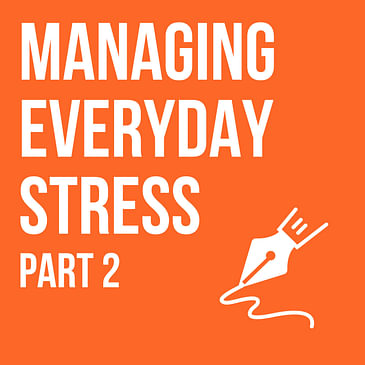Shownotes
Episode Premise
Modern-day living can be stressful - being let down by a friend, having a nasty exchange on whatsapp, losing a client at work, and many other similar situations. In this episode, we discuss dealing with this using our thoughts and intellect.
We follow the story of Sid, who runs sales at a tech company. We will see how Sid deals with a stressful situation using his thought process and intellect.
Concepts Discussed
Concepts discussed include thought suppression, rumination, expressive writing, coherent self-narrative, and journaling.
Psychologists discussed include Dr Timothy Wilson, Dr Wegner, Jamie Pennebaker, Susan Nolen-Hoeksema.
Thought Suppression
Let's try this simple experiment. Please do not think of a white polar bear. If you are like most people, chances are that an image of a white polar bear comes to your mind. That’s the irony psychologist Dr. Daniel Wegner and others studied. The more we try to suppress a thought the stronger it comes back. Dr. Wegner and others conducted multiple studies on this and found that. Even if we try and think of something else or distract ourselves with something. While we may succeed briefly, eventually all negative thoughts come rushing back.
Rumination
Ruminating means thinking of the same thoughts again and again - in a repetitive pattern When something negative happens, we take one small disturbing segment of that episode and keep playing it in our minds. Dr. Susan Nolen-Hoeksema, a professor at Yale, has found ruminating very common among folks going through adversity. She says this is self-defeating. Leads people to have a very negative view of the future. That’s what anxiety is - a negative view of the future.
So from a psychological point of view - both thought suppression and rumination create disturbing mental chatter in our minds. Even though we may get on with life, these obsessive thoughts keep coming back and consuming us.
Expressive Writing
Writing our thoughts helps us move the circular pattern forward and create a coherent narrative. This is needed to process the negative thoughts and move forward.
Psychologist Jamie Pennebaker recommends "expressive writing" as a form of therapy. He asks individuals to write down their deepest feelings and thoughts about a stressful event. He asks them to focus not on events or dates or facts but on feelings and thoughts. Not to bother with grammar or language. Not to censor anything but to write openly in whatever words emerge. This can be done over 2-4 days. Typically 20-30 minutes a day.
We might start with incoherent sentences but eventually, we will calm down and explain the negative thought in a clear coherent narrative. The act of doing this enables us to accept our suffering and is the first step to healing.
Here's a simple article on how to do expressive writing.
Resources
Recommended books -
Expressive Writing - James Pennebaker
Strangers to ourselves - Timothy Wilson
White bears and other unwanted bears - Daniel Wegner
Women who think too much - Susan Nolen-Hoeksema
Recommended journaling app -
Next Episode
- Our first guest - Executive coach & Author Ruchira Choudhary
- We talk about coaching as a life skill
- Ruchira's recent book on coaching has gotten huge global acclaim with leaders like Sheryl Sandberg endorsing her book.
